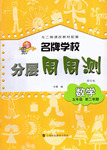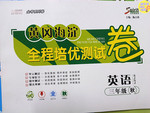


 名牌学校分层周周测系列答案
名牌学校分层周周测系列答案 黄冈海淀全程培优测试卷系列答案
黄冈海淀全程培优测试卷系列答案科目:高中英语 来源: 题型:阅读理解
My Forever Valentine 我永远的“情人”
Valentine’s Day was the time my father chose to show his love for the special people in his life. Over the years I fondly (天真的) thought 1 him as my “Valentine man”.
My first recollection of the 2 he could bring to Valentine’s Day came when I was six. That morning at the breakfast table I found a card and a gift-wrapped package at my chair. The card was 3 “Love, Dad” and the gift was a ring with a small piece of red glass to 4 my birthstone, a ruby (红宝石). There is 5 difference between red glass and rubies to a child of six, and I remember 6 that ring with pride that all the cards in the world 7 not surpass (超越).
8 I grew older, the gifts gave 9 to heart-shaped boxes filled with my 10__ chocolate and always included a 11 card signed “Love, Dad”. In those years my thank-you became 12 of a perfunctory (敷衍) response. The cards seemed less 13 , and I took for granted that the Valentine would 14 be there. I had 15 my hopes and dreams in receiving cards and gifts from “significant others” and “Love Dad” just didn’t seem quite 16 .
His final card remains on my desk today. It’s a 17 of how special fathers can be and how important it has been to me over the years to know that I had a father who continued a 18_ of love with simple acts of understanding and an ability to express happiness over the people in his life.
Those things never 19 , nor does the memory of a man who never 20 being my Valentine.
A. of B. about C. up D. over
A. memory B. magic C. puzzle D. presents
A. read B. written C. shown D. signed
A. recover B. resemble C. represent D. replace
A. much B. little C. great D. less
A. having B. owning C. wearing D. watching
A. could B. did C. must D. should
A. Because B. Since C. When D. As
A. room B. way C. honour D. seat
A. favorite B. lovely C. dear D. precious
A. usual B. common C. strange D. special
A. less B. little C. more D. much
A. important B. beautiful C. familiar D. standard
A. surely B. always C. regularly D. often
A. let B. kept C. placed D. remembered
A. suitable B. enough C. effective D. sacred
A. signal B. certificate C. consequence D. reminder
A. tradition B. hobby C. habit D. custom
A. lose B. die C. miss D. appear
A. thought B. wanted C. tried D. stopped
查看答案和解析>>
科目:高中英语 来源: 题型:阅读理解
My Forever Valentine 我永远的“情人”
Valentine’s Day was the time my father chose to show his love for the special people in his life. Over the years I fondly (天真的) thought 1 him as my “Valentine man”.
My first recollection of the 2 he could bring to Valentine’s Day came when I was six. That morning at the breakfast table I found a card and a gift-wrapped package at my chair. The card was 3 “Love, Dad” and the gift was a ring with a small piece of red glass to 4 my birthstone, a ruby (红宝石). There is 5 difference between red glass and rubies to a child of six, and I remember 6 that ring with pride that all the cards in the world 7 not surpass (超越).
8 I grew older, the gifts gave 9 to heart-shaped boxes filled with my 10__ chocolate and always included a 11 card signed “Love, Dad”. In those years my thank-you became 12 of a perfunctory (敷衍) response. The cards seemed less 13 , and I took for granted that the Valentine would 14 be there. I had 15 my hopes and dreams in receiving cards and gifts from “significant others” and “Love Dad” just didn’t seem quite 16 .
His final card remains on my desk today. It’s a 17 of how special fathers can be and how important it has been to me over the years to know that I had a father who continued a 18_ of love with simple acts of understanding and an ability to express happiness over the people in his life.
Those things never 19 , nor does the memory of a man who never 20 being my Valentine.
1. A. of B. about C. up D. over
2. A. memory B. magic C. puzzle D. presents
3. A. read B. Written C. shown D. signed
4. A. recover B. resemble C. represent D. replace
5. A. much B. little C. great D. less
6. A. having B. owning C. wearing D. watching
7. A. could B. did C. must D. should
8. A. Because B. Since C. When D. As
9. A. room B. way C. honour D. seat
10. A. favorite B. lovely C. dear D. precious
11. A. usual B. common C. strange D. special
12. A. less B. little C. more D. much
13. A. important B. beautiful C. familiar D. standard
14. A. surely B. always C. regularly D. often
15. A. let B. kept C. placed D. remembered
16. A. suitable B. enough C. effective D. sacred
17. A. signal B. certificate C. Consequence D. reminder
18. A. tradition B. hobby C. habit D. custom
19. A. lose B. die C. miss D. appear
20. A. thought B. wanted C. tried D. Stopped
查看答案和解析>>
科目:高中英语 来源:2012届安徽省铜陵三中高三英语综合测试卷一 题型:阅读理解
For a commuter rushing to catch a train, a minute can mean the difference between dinner with the family and leftovers (剩饭) in the microwave. What most passengers don’t realize is that their minute is already there.
Every commuter train that departs from New York City — about 900 a day — leaves a minute later than scheduled. If the timetable says 8:14, the train will actually leave at 8:15. In other words, if you think you have only a minute to get that train — well, relax. You have two.
The courtesy (礼貌) minute, in place for decades and published only in private timetables for employees, is meant as a grace period(宽限期)for those who need the extra time to get off the platform and onto the train.
“If everyone knows they get an extra minute, they’re going to waste time doing unimportant things,” explained Marjorie Anders, a spokeswoman for the Metro-North Railroad. Told of this article, Ms. Anders laughed. “Don’t blow our cover!” she said.
Entirely hidden from the riding public, the secret minute is an odd departure from the railroad culture of down-to-the-second accuracy. The railroad industry helped invent the concept of standard time, and time zones were established in the United States in the 1880s, 35 years before they were written into law. And most commuters know their train by the precise minute it departs. The trains quickly make up the minute: at all other stops, the public timetable prevails. The phantom minute does not exist at commuter railroads in Chicago, Los Angeles, Philadelphia, or San Francisco. But in New York, the secret minute dates back decades.
“That’s been done forever, from my knowledge,” said Jack Swanberg, 70, an unofficial historian of Metro-North. “I was the trainmaster starting in 1970 and I’m sure it’s been the case since 1870 for all I know.”
【小题1】The courtesy minute was hidden from the public to _____.
| A.prevent the passengers’ idleness | B.help invent the concept of standard time |
| C.show the railroad company’s consideration | D.follow the ancient tradition of New York City |
| A.Don’t publish the timetable | B.Don’t blame commuter trains |
| C.Don’t make it known by the public | D.Don’t forget our chances of catching trains |
| A.The courtesy minute exists in many cities in the US. |
| B.One minute means a lot for most of the commuters. |
| C.The courtesy minute has been in place for about ten years. |
| D.Most railroad staff in New York have no idea of the courtesy minute. |
| A.the railroads in the US | B.the secret New York minute |
| C.the mistake of the railroad industry | D.the history of New York commuter trains |
查看答案和解析>>
科目:高中英语 来源:河北省2009-2010学年度高三下学期第一次调研考试 题型:阅读理解
People say time is relative.But relative to what.I do know that sometimes time“seems”to be moving slower.Remember Christmas Eve when you were a child? It was the longest night of the year.It lasted forever! And now it seems like I just paid my bill yesterday...and it’s due again!
People tell me all too frequently…I need more time! Oh ,really?…Mother Teresa,Michelangelo,and Helen Keller all had 24 hours a day.Look what they did with their time!
Is it that we need to manage our time better…or our priorities(重点)?You’ve heard the expression“first things first.”The first step in understanding the power of time is to understand that it is limited.Why is it then that some people get a lot more done? We know the answer.They use their time smartly.
One day an expert on time management was speaking to a group of students and announced a quiz.He pulled out a wide-mouthed jar.Next,he placed about a dozen fist-sized rocks,one at a time , into the jat, until no more would fit.“Is it full?” he asked.”Yes,”responds the class.”Oh really?” he asked.So he took out a bucket of gravel(砂砾), which he managed to work down into the spaces between the larger rocks.“Is it full now?” he asked.
Wising up,one answered,‘'Probably not.”Sure enough, he took out a bucket of sand,which he poured into the empty spaces.”Is it full now?” he asked.”No,” reply the students confidently.So he took a glass of water and filled it in.Then he asked,“What is my point?’’
One said,‘'No matter how full your schedule is,if you try really hard,you can always fit some more things into it!”
“No,”the speaker replied,“It tells us if you don’t put the big rocks in first, you’ll never get them in at all.’’
What are the big rocks? The things you should put in to your jar first.
The rich don’t get 25 hours and the poor don’t get 23…we all get the same.Let’s use them wisely! Invest your time wisely!
49.What does the point of the quiz lie in_______.
A.How to put more things into ajar. B.How well the students learn the lesson.
C.How to get more done in limited time D.The skill and order is very important.
50. “The big rocks”in this passage refers to_______?
A.difficult points. B.advantages C.minor things D.focuses
51. How is the passage mainly developed?
A.By inferring. B.By comparing.
C.By listing examples. D.By giving facts.
52. The text is written mainly
A.to explain the origin of the expression “first things first”
B.to call on us to use our time in a smart manner
C.to introduce a meaningful class given by an expert
D.to tell us about the relativity and the power of time
查看答案和解析>>
湖北省互联网违法和不良信息举报平台 | 网上有害信息举报专区 | 电信诈骗举报专区 | 涉历史虚无主义有害信息举报专区 | 涉企侵权举报专区
违法和不良信息举报电话:027-86699610 举报邮箱:58377363@163.com